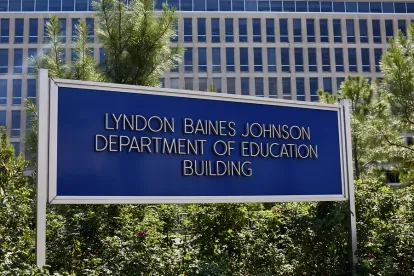As discussed in our October 18, 2018, alert, regulations promulgated by the U.S. Department of Education (the “Department”) in November 2016 concerning borrower defenses to repayment and financial responsibility standards (the “2016 BDR Rules”), whose original effective date was postponed by the current administration, were reinstated on October 16, 2018, pursuant to a federal court order. Among those now-effective 2016 BDR Rules are extensive events and actions—so-called “triggers”—that either automatically or in the Department’s discretion deem an institution “not able to meet its financial or administrative obligations,” thereby requiring the institution to provide the Department with an irrevocable letter of credit or another form of financial protection. Except where otherwise specified, these financial responsibility triggers apply to all private nonprofit and for-profit institutions of higher education that participate in the Title IV federal student aid programs (“Title IV”).
Automatic Triggers: As set forth in the 2016 BDR Rules, any one of the following events automatically requires an institution to provide the Department with an irrevocable letter of credit or other financial protection:
- Cohort Default Rates (“CDRs”): The institution’s two most recent official CDRs are 30 percent or higher, unless (a) the institution files a challenge, request for adjustment, or appeal with respect to its rates for one or both of those fiscal years; and (b) that challenge, request, or appeal remains pending, or results in reducing the CDR below 30 percent, or precludes the rates from either or both years from resulting in a loss of Title IV eligibility;
- 90/10 violation in a single fiscal year: An institution subject to the 90/10 rule for Title IV program participation does not derive at least 10 percent of its revenue from sources other than Title IV program funds in its most recently completed fiscal year; or
- Publicly traded institutions: Any of the following occur: (a) the Securities and Exchange Commission (“SEC”) warns the school that it may suspend trading on the school’s stock; (b) the school fails to timely file a required annual or quarterly report with the SEC; or (c) the exchange on which the stock is traded notifies the school that it is not in compliance with exchange requirements, or the stock is delisted.
Composite Score Adjustment Triggers: Under the 2016 BDR Rules, the following events and actions will cause the Department to recalculate an institution’s composite score for its most recently completed fiscal year. If that recalculation results in a composite score below 1.0, and the institution is not otherwise able to demonstrate that the event will not have any such impact by, for example, providing evidence that the event is covered by insurance or has been resolved, the institution will be required to provide the Department with an irrevocable letter of credit or other financial protection:
- The institution is required to pay any debt or incurred liability from a final judgment in a judicial or administrative proceeding, or from a settlement;
- The institution is being sued in an action brought on or after July 1, 2017, by a federal or state authority for BDR claims, and the suit has been pending for 120 days;
- Any other litigation initiated on or after July 1, 2017, against the institution if the suit has survived a motion for summary judgment/disposition or the institution has not attempted to move for summary judgment and the suit progresses to a pretrial conference or trial;
- A requirement by the institution’s accrediting agency that it submit a teach-out plan, including because the institution is closing a branch or additional locations;
- A determination by the Department that the institution has Gainful Employment programs that could become ineligible for Title IV program funds in the subsequent year on the basis of its final debt-to-earnings rates; or
- For a proprietary institution whose composite score is lower than 1.5, any withdrawal of owner’s equity by any means, including by declaring a dividend, unless the equity is transferred within the affiliated entity group on whose basis the institutional composite score was calculated.
Discretionary Triggers: The 2016 BDR Rules establish that the Department may, in its discretion, require an irrevocable letter of credit or other protection in the following circumstances:
- There is a significant fluctuation in the year-to-year Direct Loan or Pell Grant funds, or a combination of those funds, received by the institution that cannot be accounted for by changes in those programs;
- The institution is cited by a state licensing or authorizing agency for failing to meet its requirements;
- The institution fails a financial stress test developed or adopted by the Department;
- The institution has high annual dropout rates, as calculated by the Department;
- The institution is or was placed on probation or issued a show-cause order or placed on an accreditation status that poses an equivalent or greater risk to its accreditation by its accrediting agency for failing to meet one or more of the agency’s standards;
- The institution violates a provision or requirement in a loan agreement, and a default or delinquency event thereby occurs that triggers a change in contractual obligations or in payments, sanctions, or fees; or
- The institution has pending BDR claims or the Department expects to receive a significant number of such claims.
Under the 2016 BDR Rules, institutions generally must notify the Department of any of the above financial responsibility triggers within 10 days of its occurrence. Additionally, an institution’s failure to timely report the occurrence of a trigger is itself a failure of Title IV financial responsibility requirements, and such failure to report a trigger may further result in an action by the Department to limit, suspend, or terminate an institution’s participation in the Title IV programs.
Triggers Occurring Between July 1, 2017, and March 15, 2019, Guidance
The March 15, 2019, guidance acknowledges that due to delayed implementation of the 2016 BDR Rules, institutions may have experienced financial responsibility triggers since July 1, 2017, but not reported those events to the Department as required under the regulations. The Department anticipates that the majority of actions or events related to debts, liabilities, and losses—i.e., matters triggering recalculation of the most recent composite score—are reflected in the institution’s most recent financial statement submitted after July 1, 2017. Institutions must therefore submit a separate notification of any of the following events if they occurred after the fiscal year end for the most recent annual financial audit submission to the Department:
- The institution has a debt or liability arising from a final judgment/determination (judicial or administrative proceeding) or from settlement;
- The institution was required by its accrediting agency to submit a teach-out plan; or
- For an institution with a composite score lower than 1.5, any withdrawal of owner’s equity from the institution.
Institutions also must notify the Department of any (1) lawsuits that have been brought by a federal or state authority regarding borrower defense claims and that have been pending for more than 120 days and that were still pending as of March 15, 2019; or (2) lawsuits of any other type that were brought after July 1, 2017, and were still pending as of March 15, 2019, and survived the motion for summary judgment stage of litigation.
The Department also expects institutions to notify it of any of the following actions or events that have occurred since July 1, 2017:
- The institution violated the 90/10 rule for any single fiscal year;
- The SEC warned a publicly traded institution that it may suspend trading on the institution’s stock, the institution failed to file timely a required annual or quarterly report with the SEC, or the exchange on which the institution’s stock is traded notified the institution that it is not in compliance with exchange requirements or the stock was delisted;
- Any of the “discretionary” triggers regarding state authorizing agency citations and accrediting agency show-cause orders or probation actions, unless such matters were resolved as of March 15, 2019; and
- Violations of any loan agreement requirements.
For any of the above-described actions or events occurring between July 1, 2017, and March 15, 2019, institutions must notify the Department via email by May 14, 2019. The specific email address for such notifications is FSAFRN@ed.gov.




 />i
/>i

